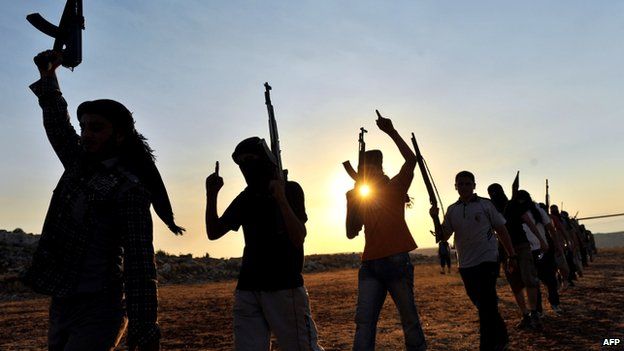Who are Australia's radicalised Muslims?
- Published

Concern has been rising in Australia since mid-2014 over the number of its citizens fighting for the Islamic State militant group.
Officials are worried about both the effect of returnees, and those who support them and their activities, on domestic security.
So who are these fighters and how large is the problem of radicalisation? The BBC explains.
How serious is the problem?
Authorities are concerned about a minority of Australia's small Muslim community.
Foreign Minister Julie Bishop in March 2015 said at least 90 Australians were in Iraq and Syria supporting IS, and another 20 Australians had been killed in the conflict.
About 100 passports had been cancelled on national security grounds, she said.
Who are the Australian jihadists?
Terrorism expert Clive Williams of the Australian National University says Australian jihadists are Sunni Muslims, the branch of Islam which the Islamic State (IS) follows.
Studies have shown that more than half of those who have embraced radicalism were born in Australia and about 60% are of Lebanese heritage.
Most were married with children, and were not particularly religious prior to believing in extreme Islamic ideologies.
What about specific individuals overseas?
The issue of foreign fighters began making headlines in July 2014, when an 18-year-old from Melbourne blew himself and several others up in a suicide bomb attack in Iraq.
Arrest warrants were issued that same month for two Australian IS fighters, Khaled Sharrouf and Mohamed Elomar. Sharrouf was previously jailed for plotting to attack the Lucas Heights nuclear reactor in Sydney.
Local media have described Mohammad Ali Baryalei, a former Sydney bouncer, as Australia's most senior IS member. He was reportedly killed in Syria in late 2014, although authorities have yet to confirm it.
In October 2014, videos emerged of an Australian teenager who had joined IS threatening attacks on PM Tony Abbott, the US and the UK. The 17-year-old, named as Abdullah Elmir but who calls himself Abu Khaled, was believed be in Syria.
In March 2015 it was reported that another Australian teen, an 18-year-old Muslim convert from Melbourne, who travelled to the Middle East to fight with the Islamic State, had died in a suicide attack in Iraq.
What about the effect in Australia?
Two men believed to have been recruiting people to fight in Syria were arrested in September 2014, when authorities raided an Islamic centre in Brisbane, Queensland. One man was believed to be the brother of Abu Asma al Australia, said to be the first Australian suicide bomber to die in Syria.
That same month, authorities revealed an an apparent plot to kill members of the public selected at random, linked to an intercepted phone call involving Baryalei. More than 800 policemen conducted raids across Sydney which resulted in 15 people arrested.
On 23 September, teenager Abdul Numan Haider - described by police as a known terror suspect - stabbed two counter-terrorism officers at a police station in Victoria state. He was shot dead.
Australia saw its most high-profile threat on 15 December, when self-styled cleric Man Haron Monis took hostages in a Sydney cafe.
Two hostages were killed and Iranian-born Monis was shot dead. He had asked for an IS flag during the siege, but no evidence of direct links with the group has been reported.
In February 2015 two men, Omar Al-Kutobi and Mohammad Kiad, were arrested and charged with planning a terror act in Sydney.
What is the government doing?
In September 2014, Australia raised its terror threat level from medium to high - meaning that an attack was likely.
In early October, it joined the US-led coalition carrying out raids on IS sites, with Prime Minister Tony Abbott saying it was a "death cult" that must be stopped.
It passed legislation making it easier for the government to cancel passports and ban Australians from travelling to certain areas, and has now banned travel to the Iraqi city of Mosul and Syria's Raqqa province, which are IS strongholds.
Most recently, it committed 300 more troops to help train the Iraqi army to fight against IS.
How has the Muslim community in Australia reacted?
Australia's mostly overseas-born Muslim community makes up just 2.2% of the country's population, according to the 2011 census.
Prominent community representatives, including the Grand Mufti who is the country's top Muslim authority, have condemned extremist violence.
But they have also criticised the Australian government's anti-terror laws, saying they restrict freedoms and harm relations with the Muslim community.
They have raised concerns that Australia's military involvement in Middle East conflicts would stoke radicalisation at home. And campaigners have also reported a rise in verbal or physical attacks on Muslims in recent months.